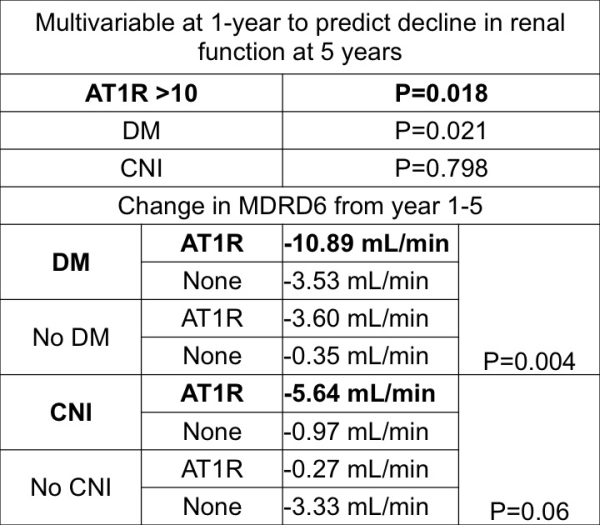AT1R Antibodies at 1-Year Negatively Impact 5-Year Native Renal Function in Liver Transplant Recipients.
1Baylor Simmons Transplant Insttute, Baylor University Medical Center, Dallas, TX
2Internal Medicine, Charite, Berlin, Germany.
Meeting: 2016 American Transplant Congress
Abstract number: 80
Keywords: Alloantibodies, Liver transplantation, Renal dysfunction, Renal function
Session Information
Session Name: Concurrent Session: The Kidney in Liver Transplantation
Session Type: Concurrent Session
Date: Sunday, June 12, 2016
Session Time: 2:30pm-4:00pm
 Presentation Time: 3:18pm-3:30pm
Presentation Time: 3:18pm-3:30pm
Location: Room 302
Angiotensin II Type-1 Receptor (AT1R) antibodies have been associated with pulmonary hypertension, renal allograft loss, and fibrosis progression in liver allograft recipients especially if combined with HLA donor-specific alloantibodies (DSA). However, long-term outcome in liver allograft recipients is not only impacted by allograft fibrosis but also renal function. We therefore sought to determine if native renal function was impacted in liver allograft recipients by the presence of AT1R antibodies.
Methods: Primary liver allograft recipients at Baylor University Medical Center from 1/00 to 4/09 had their prospectively collected pre-transplant (1269 patients) and year-1 post-transplant (795 patients) serum tested retrospectively for AT1R (>10) antibodies. AT1R-antibody testing was accomplished with standardized solid phase assay. Since AT1R antibodies have been associated with hypertension this factor was not controlled for in multivariable modeling.
Results: Pretransplant AT1R did not change the median delta creatinine from pretransplant to 3-months post-transplant. In patients with vs. without AT1R at 1-year post-transplant a median unadjusted change in MDRD6 of -5.4. vs. -1.1mL/min (P=0.01) was found. In multivariable analysis when controlling for diabetes (DM) and calcineurin inhibitor (CNI) use at 1-year AT1R-Ab at 1-year remained statistically significantly associated with a decline in GFR (calculated by MDRD6) from year 1 to 5 post-transplant (p=0.018, Table 1). This decline may have been more pronounced (p=0.06) in patients on a CNI; however, the decline was most pronounced in diabetic patients with AT1R at year-1 (p=0.004).
Conclusion: AT1R antibodies post-liver transplant are associated in multivariable analysis with an increased risk of native renal function decline especially in diabetic patients. AT1R positive patients may benefit from CNI free immunosuppression.
CITATION INFORMATION: O'Leary J, Philippe A, Heidecke H, Freeman R, Jennings L, Catar R, Klintmalm G, Dragun D. AT1R Antibodies at 1-Year Negatively Impact 5-Year Native Renal Function in Liver Transplant Recipients. Am J Transplant. 2016;16 (suppl 3).
To cite this abstract in AMA style:
O'Leary J, Philippe A, Heidecke H, Freeman R, Jennings L, Catar R, Klintmalm G, Dragun D. AT1R Antibodies at 1-Year Negatively Impact 5-Year Native Renal Function in Liver Transplant Recipients. [abstract]. Am J Transplant. 2016; 16 (suppl 3). https://atcmeetingabstracts.com/abstract/at1r-antibodies-at-1-year-negatively-impact-5-year-native-renal-function-in-liver-transplant-recipients/. Accessed February 18, 2026.« Back to 2016 American Transplant Congress
